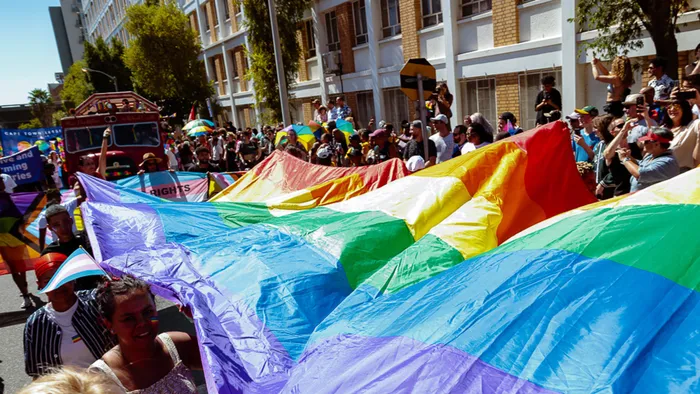
UK Supreme Court ruling on the definition of a woman sparks fears among trans people
Image: Supplied
TRANSGENDER Day of Remembrance conceived in 1999 by transgender advocate Gwendolyn Ann Smith from the USA as a vigil to honour the memory of Rita Hester, a transgender woman who was murdered in 1998 in Boston, Massachusetts, has since grown into a worldwide LBTIQ+ memorialisation to specifically honour transgender and non-binary persons murdered for expressing their right to freedom of expression of their gender.
To me, as one of the three architects of the Alteration of Sex Description Act of 2003 (alongside Estian Smit and the late intersex advocate Sally Gross) assented by former President Thabo Mbeki in March 2004, it’s equally a day of remembrance as to how far we’ve come with transgender rights in South Africa, and how far we still have to go to extend it and incorporate it as human rights.
In our Constitution signed into law on 10 December 1996, Section 9 guarantees the right to equality and prohibits discrimination based on gender, among others. It further states that national legislation must be enacted to prevent or prohibit unfair discrimination.
In South Africa I seek to remind those who wish to transpose their “MAGAnification” ideology imported from the United States and other transphobic narratives that The Alteration of Sex Description Act of 2003 is one of the cornerstones of legislation to prohibit discrimination if a transgender person seeks to correct their gender on their identity document as opposed to their wrongfully assigned “sex” at birth.
It equally provides redress to those who either do not want full reassignment surgery, those who cannot afford surgery or those whose health and age are compromised to correct their gender together with medical support documentation.
Technically this was the first Act of its kind in the world followed by the Gender Recognition Act of 2004 in the UK. Countries like Argentina went one step further in 2012 and legally allowed a change of name and gender marker under standards of self-identification, thus no doctor's letters, while furthermore it entrenched the right to comprehensive health care – which our law does not but one would assume that it is subsumed under Section 27 of the Constitution that underscores that everyone has the right to have access to health care services, of which gender affirming care is paramount to transgender persons.
The recent ruling by Judge Denise Fisher of the Equality Court that saw the transgender women prisoner at Johannesburg Correctional Services, Nthabiseng Mokoena, rendered entitled to her hormone therapy, freedom to express her gender identity, including the use of the pronouns “she/her” and to be housed in a single cell or in a cell with other transgender prisoners, lends to the obligation of gender affirming care as a human right health care provision.
However, despite several of these progressive laws across the world, we have unfortunately seen how right wing governments and TERFS (trans-exclusionary radical feminism) such as J.K. Rowling and her unfortunate cheerleader our own Helen Zille, seek to usurp these rights with Executive Orders, the unscientific ruling by the UK Supreme Court determining that "sex" in the Equality Act 2010 refers to biological sex, impacting access to single-sex spaces for transgender women and men thus undermining the Gender Recognition Certificate.
In Argentina, the right wing government of Javier Milei enacted the Necessity and Urgency Decree 62/2025 which denies access to gender affirming care of transgender persons under 18 and violates the dignity of trans people deprived of their liberty, among others.
Thus, on this Transgender Day of Remembrance we must be vigilant that transgender rights are not usurped by loopholes in our Constitution that allows “fair discrimination” as per Section 9, subsection (5) that provides that "Discrimination on one or more of the grounds listed in subsection (3) is unfair unless it is established that the discrimination is fair."
On the 21 November, a day after Transgender Day of Remembrance, we will see the Women For Change activation of a Shutdown as a means to seek the State to declare a national emergency on GBV and femicide in particular that rose to 33.8% from the previous year.
The campaign is LGBTI inclusive subsuming transgender women being murdered for the person they express that they are.
While we remember the transgender women victims including the so-called corrective rape of lesbians who present as masculine, of which some “corrective” rapes have resulted in their murders too, we equally remember the cisgender women murdered because collectively transgender women and cisgender women are all women.
Equally we need to support transgender men especially those transitioning. We call on all South Africans to respect the Constitution, its values and its protection irrespective of what your respective religious dogmas or cultural diktats may say.
The Constitution is paramount and is secular and deserves respect. We fought long and hard for its freedoms. We cannot continue on a destructive path where we kill women due to sexism, and patriarchy, murder transgender persons due to prejudice, and shoot our sisters because we don’t agree with a magisterial ruling.
Aluta continua!
Heradien is a gender activist